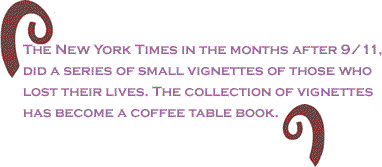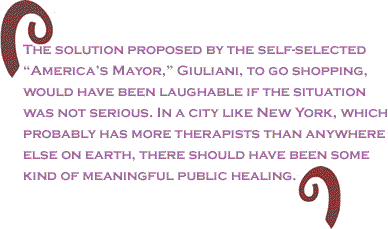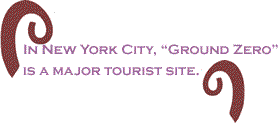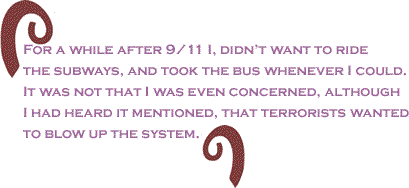
|
||||||||||||||||||||||

|
|
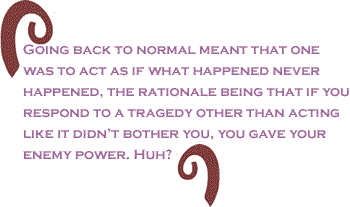 |
|
| People in New York City do not talk about 9/11. What I mean is it doesn’t pop up in casual conversation – like conversations I have had with people who don’t live here. For example, last Thanksgiving in Connecticut, when a friend opened the trunk of her car to remove something, she commented on the 12-pack of water in her trunk, saying it was there in case of another 9/11. No one I know in New York City has ever made or thought to make, such a contingency based on that event. In Summer 2004, I was in the state of Ohio doing Presidential election voter registration and canvassing. There were people there from all over the country, Ohio being a battleground state. Invariably, in the middle of a conversation with other out-of and in-state people, the subject of 9/11 would arise until they learned that I was from New York, and then nothing more would be said. I would not even be asked about any associations I had with the event. For a while after 9/11 I, didn’t want to ride the subways, and took the bus whenever I could. It was not that I was even concerned, although I had heard it mentioned, that terrorists wanted to blow up the system. I actually figured they wouldn’t do that becaue they themselves might need to get around in New York, and it is the most efficient and quickest way to travel. It was the sense of being underground in a dark tunnel, unable to see anything. But I had to take the subway to attend the funeral of a friend who died in the second tower that was hit. The only way I could endure it was that I knew I would be getting a ride back home. At my local fire station on the Upper East Side where I lived at the time, nine men were killed at the World Trade Center. For months there was a shrine outside the station house, with people adding flowers and toys and candles on a daily basis. In the Union Square subway station on the East Side, there is also a display of the men killed who were attached to the police precinct at that station. It is the same at the Civil Court building in lower Manhattan. In New York City, “Ground Zero” is a major tourist site. On Wall Street, near “Ground Zero”, where I am frequently, the New York Stock Exchange erected a huge American flag on the side of its building which every tourist seems to want to capture on film. Several times there are two flak-jacketed police with automatic rifles standing outside the Exchange, posing for pictures; I guess they are there to reassure the tourists, because if anything ever went down, those two would be of no use at all. At several subway stops, including my local stop far away from “Ground Zero” in a very residential African descendant neighborhood in Brooklyn, on some indeterminate schedule since 9/11, police will set up a table, supposedly to inspect backpacks and large bags. I always carry a large bag and/or back pack and would never submit to an inspection. At my stop I have never seen anyone who has.
When they first started doing it, right after the event, many people would volunteer to be inspected. Of course this action was counter-intuitive and counter-productive, but it seemed that people used this action to prove themselves the “good guys”. It is not that 9/11 is not talked about in New York at all. There are several organizations that have and are demanding wider and better investigations into what happened. There is the 9/11 Truth Commission, as well as others. But 9/11 is not a part of every day casual conversation ever. It is not referenced casually. This year, eight years after the event, as every year since, the memorials will go on, the naming of names; the display of the families who lost members. But what the tourists inadvertently point out with their souvenirs and picture-taking, is that 9/11 happened to all of us: the fear, the assumption of security that was lost; the awareness that since it happened it could happen again; that it did not just happen to the families who lost someone A former friend of mine, no longer a friend at the time of the event, becoming one again later, told me that she came to New York for a month shortly after 9/11 in order to go to the site every single day! She grew up in Massachusetts and has spent most of her life in Baltimore.
The solution proposed by the self-selected “America’s Mayor,” Giuliani, to go shopping, would have been laughable if the situation was not serious. In a city like New York, which probably has more therapists than anywhere else on earth, there should have been some kind of meaningful public healing. One foundation for which a friend of mine worked, offered a tape on coping with disaster which was not useful. It talked about the symptoms, never how to deal with it. In a similar vein, the University of Virginia also put out an anthology, “Fear Itself”, which also did not have coping solutions. And FEMA. That agency deserves all the opprobrium directed at it, although maybe not for their handling of 9/11. On local TV, there was a public service announcement for people wanting help coping with the 9/11 event, understanding that it infected everyone, not only those directly involved. So I called the number. I got three numbers to call, depending on my zip code. One number never called back. One had no space, and another didn’t know what I was talking about. I tried again, and this time I wanted to know if Harlem Hospital had any services, figuring that I wanted to be in an African American setting. So I went there. They didn’t know what I was talking about in terms of FEMA services, but they were willing, since I presented myself, to talk treatment. It turned out that treatment was some pills. I was not suffering from a deficiency of whatever the pills contained, but I took one, got a terrific headache as a reward, and threw them away. On my next appointment, the doctor was not in, I would have to see another, and start all over again trying to explain why I was there. That was it for me. I didn’t have the strength. I was talking to someone who worked as a counselor at a homeless shelter. She was saying, and this was in 2005, that the women who came into the shelter in recent years were different, edgier, more aggressive, more difficult. I asked her was that since 9/11. She had never, until asked, pinpointed when the change had happened. September 11, 2001, was Primary Election Day in New York City, and I was working in a campaign in East Harlem. The candidate, Felipe Luciano, who has an activist history in New York as a former Young Lord and TV personality, looked very good to be the winner that day against an incumbent, except of course elections were rescheduled until two weeks later. He lost. His loss, I think, was a direct result of 9/11, voters unwilling to make any adjustments in their lives they didn’t have to make.
One of the workers in the campaign lived on the Lower East Side, near Ground Zero. Getting home was tricky as his subway stop was closed after a certain hour, so some of us would get in the campaign van and take him home. None of us, no matter how many times we went there, ever wanted to go to the “Ground Zero” site itself. We didn’t want to see. We had seen enough. Up in Harlem that day, which is on a rise, you could see the smoke which obscured the southern horizon. The need to go to the site; the need to see and be there, I contend is a way of dealing with one’s personal traumas. I didn’t go because I knew what had been unearthed. It didn’t help with the solution – that would take a few years and some circuitous routes I never saw coming. The New York Times in the months after 9/11, did a series of small vignettes of those who lost their lives. The collection of vignettes has become a coffee table book. In the library where I encountered the book recently, I looked up the person I knew, (at least the one I knew about immediately), who died in the second tower, after calling her husband after the first plane hit, telling him she was all right. If I had just read the small story about her, without her name attached to it, I would have never known who it was. It was so general; I can’t even remember what it said. She was a good friend of a good friend of mine; we knew each other well, years before we ever met. Reading her profile and reading some of the others, I wondered what other myths were being created. In the weeks and months after the event, there were many high alerts. One afternoon, listening to the radio, I heard that new targets were going to be supermarkets and banks. Later, I realized that all it did was remind me that I had to go to the supermarket to get something. Supermarkets being targets didn’t make any sense. Banks as targets made a small symbolic sense. That the World Trade Center was a target (twice) made a political sense. It was symbolic of what those who were angry were angry about. Terrorists’ gestures had mainly been large events with layered meanings. That is why when the Federal Building in Oklahoma City was bombed, the stories that it might be Arab terrorists, didn’t compute. Oklahoma City? Someone said to me that they might choose such a target because it is in America’s heartland. I told her that “heartland” was internal mythology without global meaning. No one would get it – and of course it was inside terrorism. The story of 9/11 as played out in the media was a story of whites being attacked by not whites; that not whites were “jealous of our freedoms”; that they wanted to be like us. The fact that many of those killed were all-over-the map ethnics was rarely shown. The World Trade Center, if you didn’t live downtown, (as most people don’t) or work in one of the buildings or the area, did not have an impact on your daily life. The year before I did have to go there for an appointment and was told I had to bring ID with me. When I got there I was surprised at the level of security in place. Not only did you have to have ID; you had your picture taken and a badge made and then the person with whom you had an appointment was called to make sure you were expected. I think they even monitored the elevators to make sure you got off on your intended floor. I surely had not been up in the Towers in years.
Before 1993 I had been there many times. I had a friend who worked at Windows on the World, at the top of the building. That is how I learned that the building purposely swayed on windy days. I had been to meetings there. Externally, it was largely a tourist attraction to the observation deck and the mall on the ground floor; otherwise, the Twin Towers were just a part of the New York skyline. In 2004 I also did some political canvassing on Staten Island, going there on many Saturdays, taking the Ferry from the bottom tip of Manhattan. On the Ferry the first time at least, one was acutely aware of the missing buildings – the skyline had changed; but the Ferry held another tragedy. The year before the Ferry had, I think, its worse accident in its history, killing eleven people and injuring many more, because of the inattention of a Ferry captain. So one was aware of that as well; the refurbished accidental boat being the one in service on many of those Saturdays. “Go shopping”; “Go back to normal”. There came a point shortly after the event, when I could no longer hear that; could no longer stand turning on the TV; could not hear another word about the event. Most of it was not illuminating in ways that might help one cope. “Go shopping”. There are organizations (something like Shopoholics Anonymous), for people who respond to the issues in their lives by shopping. What was shopping for anything other than what was very necessary going to do? “Go back to normal”. That was the worse response, the one that really got me to turn off the TV. Going back to normal meant that one was to act as if what happened never happened, the rationale being that if you respond to a tragedy other than acting like it didn’t bother you, you gave your enemy power. Huh? And then the Mayor, who was term-limited, wanted to be able to extend his term in this election season. He wanted a mandate to do something un-normal. He was given and gave himself points for doing his job – a job I think could have been done so much better; and besides the fact that he had placed the City’s Emergency Center in the World Trade Center against the advice of those who would be responders. Everywhere on the streets were the pictures. They were called missing; everyone said their loved one was missing. We said that about my friend as well. A friend of mine who lived near Bellevue Hospital realized that the medical centers would need help. He lived in midtown but had a clear shot of the Towers from his balcony and got pictures of the second hit. He described the people coming into the hospital with pictures, going from hospital to hospital looking for their people. It was he who first alerted me to the fact that although the media was highlighting a certain kind of tragic figure and a certain kind of first responder, that is not what he saw on the ground. All over the City, especially in those places where tourists were likely to be in large numbers, the police presence was increased. I guess it was reassuring. The first major event that was not cancelled, I think, was the Thanksgiving Day Parade sponsored by Macy’s. That Thanksgiving holiday was my first trip out-of-town since the event when I flew to Atlanta, graciously invited by friends who thought I could use the break. Although I had flown many times, and even liked flying, I had said I would never fly again. A week before leaving there was a tragic plane crash out of Kennedy Airport, which killed all on board. My hands actually shook while listening to the news. A month after 9/11, on October 11th, was the funeral service for the friend who died. That was the trip I had to take to Brooklyn. The service in a synagogue was not only packed, they had to put speakers outside for the overflow, and that was packed as well. Her oldest son spoke eloquently about his mother. He was fourteen. One of the things she talked about when I last saw her about two months before the event, was the bar mitzvah of her oldest son which had taken place a few months before and the bar mitzvah of the younger whose would take place the following year. She was so proud that the bar mitzvah for the younger son was all paid for; all arranged. She loved that she worked at the World Trade Center. We had met, a group of us, celebrating the birthday of our mutual friend, in a park near the Towers. I think the park was her idea. We played softball and ate too much – drank some. At the end of the evening, after dusk, when we could no longer see the ball, which indicated that it was time to go home, we walked down to the World Trade Center to get our various subways.
She was so excited when we got to the building. I had taken the subways from there many times, but I could not say for sure that I knew my way around the place. She, 36 years old, actually skipped around to show us where we had to go, this former social worker turned recently corporate. A year later while watching a memorial, looking for her name in the list that scrolled on the TV, I found someone else I had known; whose business card I had; who I had met the year before the event. During the memorials every year since, the local Pacifica community radio station, WBAI, features a day of 9/11 programming. One year I heard the recorded observations of a janitor that had been there that day. That was interesting. He was good and articulate about his observations, and I felt I knew him, because, in a past life I had owned a janitorial business, and I understood how and the ways his observations would make sense. So now I am wondering just how many years we will continue to invoke this event as if it just happened, as if there is not grief timeline. But I am looking at this as a citizen of the City. I am ignoring for now, the political implications of its continued resurrection.
BlackCommentator.com Guest Commentator Jessica Watson-Crosby is Chair National Committee – Black Radical Congress and Co-Chair, Black Radical Congress-New York. Click here to contact Ms. Watson-Crosby. |
|
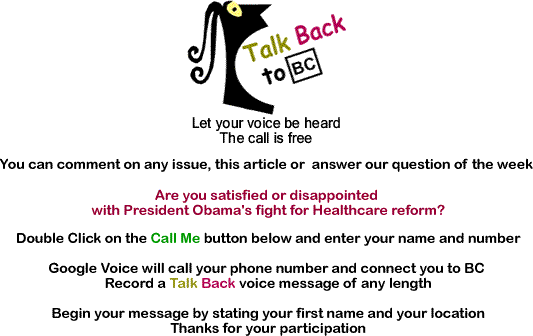 |
|
Any BlackCommentator.com article may be re-printed so long as it is re-printed in its entirety and full credit given to the author and www.BlackCommentator.com. If the re-print is on the Internet we additionally request a link back to the original piece on our Website. Your comments are always welcome. eMail re-print notice
If you send us an eMail message we may publish all or part of it, unless you tell us it is not for publication. You may also request that we withhold your name. Thank you very much for your readership. |
|
| |
|
| September10
, 2009 Issue 341 |
|
| Executive Editor: Bill Fletcher, Jr. |
| Managing Editor: Nancy Littlefield |
| Publisher: Peter Gamble |
| Est. April 5, 2002 |
Printer Friendly Version
in resizeable plain
text format or pdf
format. |
 |

|
| |
| |






























